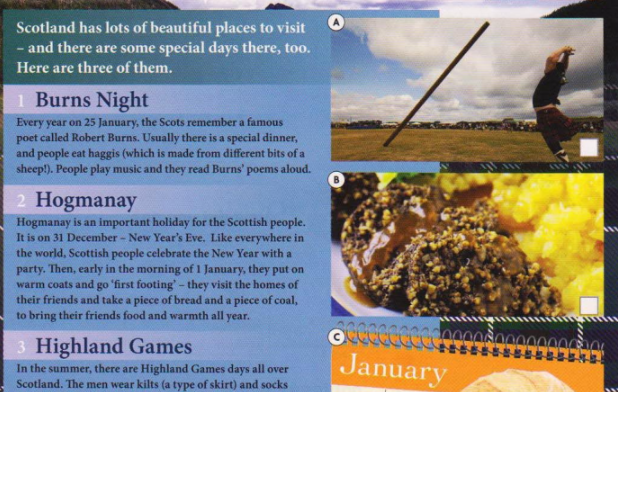
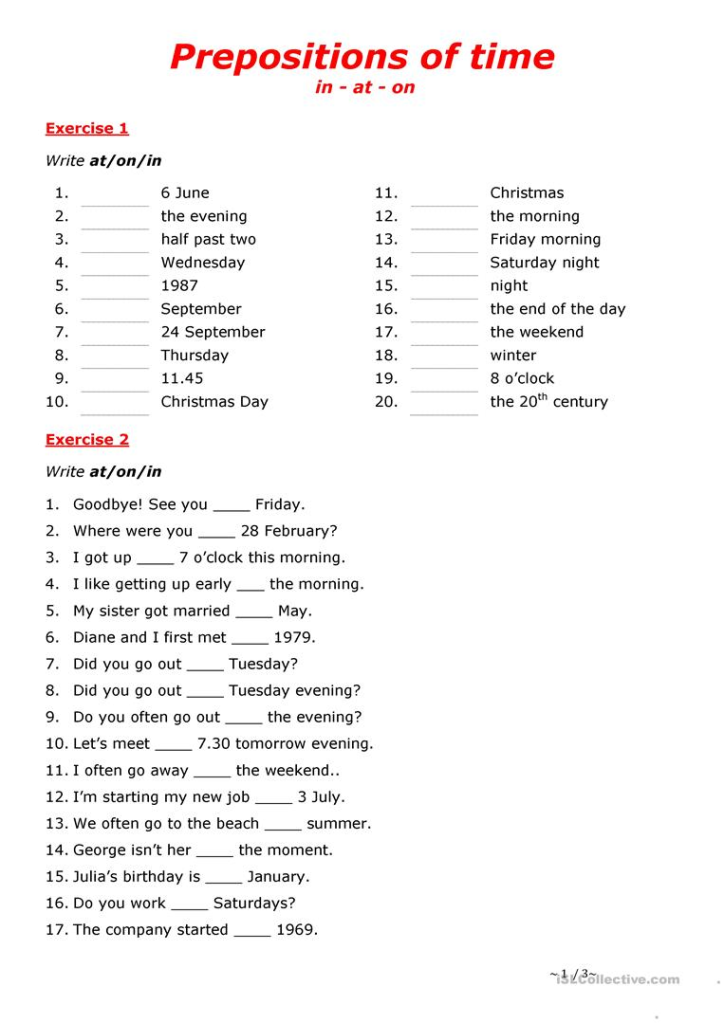


Once upon a time, there was a Kingdom. The king there only had one leg and one eye, but he was very intelligent and kind. Everyone in his kingdom lived a happy and a healthy life because of their king. One day the king was walking through the palace hallway and saw the portraits of his ancestors. He thought that one day his children will walk in the same hallway and remember all the ancestors through these portraits.
But, the king did not have his portrait painted. Due to his physical disabilities, he wasn’t sure how his painting would turn out. So he invited many famous painters from his and other kingdoms to the court. The king then announced that he wants a beautiful portrait made of himself to be placed in the palace. Any painter who can carry out this should come forward. He will be rewarded based on how the painting turns up.
All of the painters began to think that the king only has one leg and one eye. How can his picture be made very beautiful? It is not possible and if the picture does not turn out to look beautiful then the king will get angry and punish them. So one by one, all started to make excuses and politely declined to make a painting of the king.
But suddenly one painter raised his hand and said that I will make a very beautiful portrait of you which you will surely like. The king became happy hearing that and other painters got curious. The king gave him the permission and the painter started drawing the portrait. He then filled the drawing with paints. Finally, after taking a long time, he said that the portrait was ready!
All of the courtiers, other painters were curious and nervous thinking, How can the painter make the king’s portrait beautiful because the king is physically disabled? What if the king didn’t like the painting and gets angry? But when the painter presented the portrait, everyone in the court, including the king, left stunned.
The painter made a portrait in which the king was sitting on the horse, on the one-leg side, holding his bow and aiming the arrow with his one eye closed. The king was very pleased to see that the painter has made a beautiful portrait by cleverly hiding the king’s disabilities. The King gave him a great reward.
I like listening music too much. I don’t have favorite genre of music. I like different genres. I dislike rabiz, it is tasteless music for me. I don’t like singing and I think I am not a good singer. I can concentrate on other things when you I am listening to music, but whatever it is. I can play music instruments. That is piano and guitar. I play the piano better than the guitar, but I like to play the guitar more.
My playlist and my favorite songs
The Living Tombstone – Ordinary Life
The Bidding – Tally Hall (speed up)
Sickick – Mind Games
Rex Orange Country – What about me
Phantogram – Black out days (Future Island remix)
One T + Cool T – The Magic Key
Gorilaz – Clint Eastwood
Dove Cameron – Boyfriend
Aaron Smith – dancin (krono remix)
Vance Joy – Riptide
Encanto soundtrack – We don’t talk about Bruno
Knock on my door soundtrack – Romantik
ПОЛМАТЕРИ – Ярче Звезд
Нервы – я не хочу без тебя спать
I don’t remember where I hear this songs first, but mostly it was in youtube, malls and in tik tok.
My parents listen to almost the same genre of music as I do, but a lot of the songs that I like they don’t like.
Grammar
a. Write the words in the correct order.
1 don’t / playing / like / I / tennis
I don’t like playing tennis.
2 on / soap operas / watching / you / Do / TV / like
Do you like watching soap operas on TV?
3 My / swimming / sea / in / brother / likes / the
My brother likes swimming in the sea.
4 cat / Her / milk / doesn’t / drinking / like
Her cat doesn’t like drinking milk.
b. Write sentences about what the people can and can’t
2. My Dad can stand on his head (+stand on his head) and he can walk on his hands (+walk on his hands).
3.Tessa can play football (+play football) but she can’t ride rollerblade (-rollerblade).
4.Kyline and Annie can’t sing (-sing) but they can dance (+dance).
c. Complete the dialogues with the present continuous form of the verbs.
1 A: Hi, Liz. What are you doing? (do)
B: I am reading a book.
2 A: Can I talk to Claudia, please?
B: No, sorry. She is having a shower. (have a shower)
3 A: Are Peter and Angela here?
B: Yes. They’re in the living room. They are watching TV. (watch TV)
4 A: Where’s Rick?
B: He’s in Emma’s room. He is looking for a CD. (look for a CD)
5 A: Which girl is Caroline?
B: That’s her, over there. See? She is dancing with Jack.
Vocabulary
a. Put the letters in order and write the names of the sports.
2 lovelblyal-volleyball
3 ygrub-rugby
4 looflabt-football
5 askalbetbl-basketball
6 ycelc-cycle
7 ynagsmstic-gymnastics
b. Write the names of rooms and furniture in a house.
1 kitchen
2 fridge
3 living room
4 table
5 bathroom
6 shower
7 sofa
8 bedroom
9 toilet

a. Find these expressions in the story. Who says them?
1 How about a bit of football
2 Why don’t you ask Ray?
3 I’ve got lots of things to do.
4 Oh – all right, then.
1 says Darren, 2 says Mark, 3 and 4 says Ray.
d. Complete the dialogues with the expressions from Exercise 10a.
1 A: I feel really tired every morning.
B: Well, why don’t you go to bed at 11 o’clock, and not 12 o’clock?
2 A: Why don’t we go to the cinema tonight?
B: Oh, then – let’s go and see the new Lindsay film.
3 A: Adam? Can I have a bit of your Ice cream?
B: No you can’t! Go and buy your own Ice cream!
4 A: Do you like Sandy?
B: No, not really. Lots of people thing he’s nice I don’t like him.
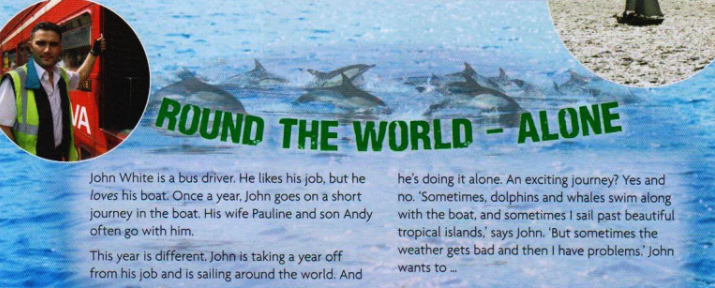
a. Here is a telephone conversation between John and Pauline. Complete the conversation with the words from the box. Then listen and check your answers.
a it’s starting b they’re swimming
c are you doing d I’m eating
e I’m getting f he’s having
Pauline: Hi, john. How are you?
John: Fine, yeah, i’m fine. How are you? What are you doing?
Pauline: Oh, I’m eating breakfast in the kitchen. Andy’s upstairs in the bathroom- he’s having shower. So, are you OK?
John: Yes, I’m making good progress. And I’m getting very close South Africa.
Pauline: Great!
John: Yes, and guess what? I can see dolphins outside! They’re swimming next to the boat.
Pauline: Oh, how lovely!
John: It is! But I’m worried. The wether’s changing. There’s a strong wind now and I’m starting to rain. to rain. A bad storm’s coming. I think. Sorry Pauline, I can’t talk any more. I have to go outside.
Pauline: John? Can you hear me, John?
b. Match the beginnings and endings of the sentences.

John is looking out of the window.
Pauline is having breakfast.
Andy is having a shower.
The dolphins are swimming.
The weather is changing.
Orienteering is a group of sports that require navigational skills using a map and compass to navigate from point to point in diverse and usually unfamiliar terrain whilst moving at speed. Participants are given a topographical map, usually a specially prepared orienteering map, which they use to find control points. Originally a training exercise in land navigation for military officers, orienteering has developed many variations. Among these, the oldest and the most popular is foot orienteering. For the purposes of this article, foot orienteering serves as a point of departure for discussion of all other variations, but almost any sport that involves racing against a clock and requires navigation with a map is a type of orienteering.
Test 1
1 Where do you come from?
2 My cousin lives in Norway.
3 They are walking on the bridge.
4 I don’t like flying, so I went to Paris by bus.
5 You can stay with me tonight.
6 My birthday is on 29th February.
7 I’ll see you at Christmas.
8 Put the books on the table, please.
9 I haven’t seen you by ages.
10 I like this house on the river.
Test 2
1 My parents got married in 2010.
2 The police station is on the right.
3 We’re going to Italy for our holidays.
4 We borrowed the bikes from our uncle.
5 There is a bridge across the river.
6 I saw Chris in the bus.
7 Be nice to your brother.
8 Let’s meet in the afternoon, not at night.
9 My friend lives in the house at the end of the street.
10 They are not at home at the moment.
Mr. Knott was a teacher. He taught in a big school in London. He lived a
long way from the school, so he was usually quite tired when he got home. At
nine o’clock one evening, when he was in bed, the telephone bell rang in the
hall of his small house, so he went downstairs, picked up the telephone and
said, ‘This is Whitebridge 3165. Who’s speaking, please?’
‘Watt,’ a man answered.
‘What’s your name, please?’ said Mr. Knott.
‘Watt’s my name,’ was the answer.
‘Yes, I asked you that. What’s your name?’ Mr. Knott said again.
‘I told you. Watt’s my name,’ said the other man. ‘Are you Jack Smith?’
‘No, I’m Knott,’ answered Mr. Knott.
‘Will you give me your name, please?’ said Mr. Watt.
‘Will Knott,’ answered Mr. Knott.
Both Mr. Watt and Mr. Will Knott put their telephones down angrily
and thought, ‘That was a rude, stupid man!’
A. Answer these questions.
B. Do this puzzle.
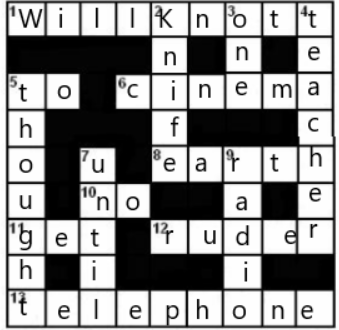
C. Write this story. Put the or nothing in each empty place.
George and Dorothy go to the school by the bus in the morning, but
they usually come home in 5.15 train. George is Dorothy’s brother. He
doesn’t like school: when he is at home, he listens to the radio or plays trumpet, and then he is happy. On the Monday morning he sometimes says,
‘I have a terrible pain in stomach,’ and he does not go to school with
Dorothy. His father and mother are already at work, so they do not
know. They go to the work very early. Dorothy plays tennis a lot. When
she leaves school, she wants to go into the army.
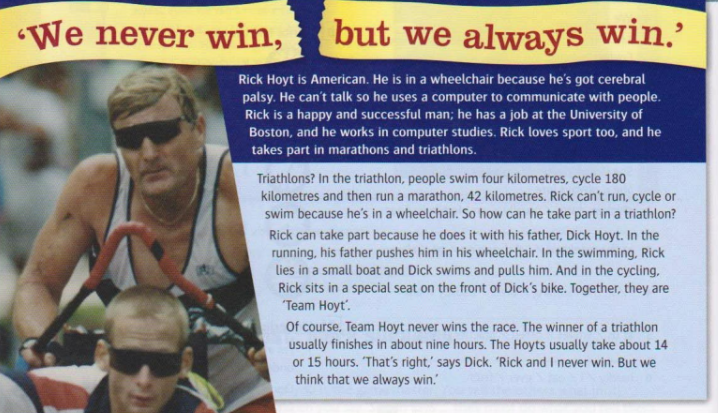
b. Read the article again and listen. Answer the questions.
1 How does Rick talk to people?
Rick talk with people with computer.
2 What do people do in a triathlon?
In the triathlon, people swim four kilometres, cycle 180 kilometres and then run a marathon, 42 kilometres.
3 How does Dick help Rick in a triathlon event?
In the running, his father pushes him in his wheelchair. In the swimming, Rick lies in a small boat and Dick swims and pulls him. And in the cycling, Rick sits in a special seat on the front of Dick’s bike.
4 What name do Rick and Dick have when they do a triathlon?
Together, they are ‘Team Hoyt’.
5 How long do they take to finish a triathlon?
It usually take about 14 or 15 hours.
6 Dick says: ‘We think that we always win’. Why does he say that, do you think?
Because when they do everything together they become happy and the fact that they were able to overcome it, is already a victory for them.
d. Complete the dialogues with the expressions from Exercise 7a.
1 A: James – would you like some pizza?
B: No thanks, Sandy – I don’t like pizza very much.
2 A: Come on, Alex It’s 8.30. We’re late!
B: Oh, right. Sorry Gill. Ok, I’m ready now – let’s go!
3 A: Is the homework difficult, Jane? Do you want some help?
B: Yes, please, Mum. Help me with question three!
4 A: I really want a hamburger. But I haven’t got any money.
B: Don’t worry, Mike. I’ve got some money. I can buy some hamburgers.